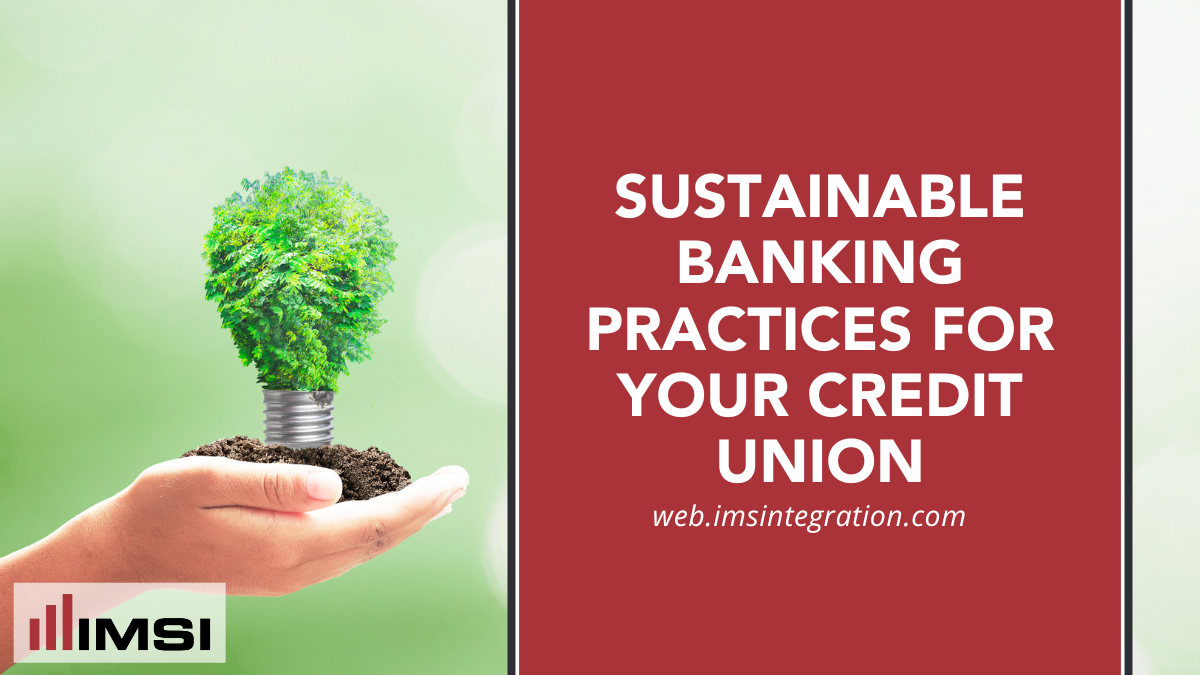Sustainable banking is a concept that prioritizes banking and investment best practices that, while pursuing profits and business stability, also prioritizes social responsibility and environmental sustainability. It shifts the discussion of “the bottom line” to include initiatives that better our communities from social and environmental perspectives.
We recently talked about financial inclusion and equity. Sustainable banking is a broader plan for making your credit union and its operations work better and smarter, for your current and future members. Transparency and trust go hand in hand and positioning your credit union as a trustworthy financial resource is one of the best ways to foster growth in your business. Here are some great sustainable banking practices for your credit union.
Strive for a Certification
Like any industry, there are several top certifications that credit unions and banks can strive for to promote your sustainable banking initiatives and lend legitimacy to your efforts.
The top ethical banking certifications that credit unions are eligible for include:
- Global Alliance for Banking on Values – This certification group includes fewer than 20 banks and credit unions, but the GABV “is a network of independent banks using finance to deliver sustainable economic, social and environmental development.”
- Fossil Free Certified – This certification is all in the name. Banks and credit unions that hope to include this sustainable banking certification in their brand must not use their funds to finance fossil fuel companies now or in the future. This certification is claimed by only ten financial institutions currently. It was started in early 2022, and the initiatives within it will likely continue to grow quickly with the number of younger customers that choose to support only green businesses.
- Community Development Credit Union – Spearheaded by Inclusiv, a community development credit union is one that is focused on serving low- and moderate-income people and communities. Targeting the underserved is another avenue by which you can create sustainable banking opportunities at your credit union.
These and other certifications are amazing ways you can show your members and communities that your credit union is committed to using your brand to spark positive change and to support globally prevalent causes.
Green Lending Initiatives
There is a strong correlation between sustainable practices and financial growth, both from personal and business standpoints. Your credit union not only stands to create positive change and contribute to a greener future, but it also brings more money into your institutions.
Green lending for individual and business endeavors is a growing subset of the financial industry. Green energy can help your individual members lower their cost of living and energy bills, and it can also help invite, nurture, and differentiate businesses in your community.
By creating green lending options and other green financial offerings, you can help drive change (and profit) towards more climate-friendly solutions. Green lending initiatives can include everything from bonds and large industrial investment ventures to small personal loans aimed at updating the energy efficiency of the appliances and electrical systems in residential homes.
Sustainability-Minded Financial Education & Events
Your credit union members come to you because of your connections to their community and your staff’s sound financial backgrounds and advice. When it comes to sustainable banking, you have a prime opportunity to help educate your members about green initiatives and involve them in sustainable events.
For example, you can create financial education courses (and hold them in your branches or online) that center around environmental, social, and corporate governance (ESG). By showing members how and where to invest and focusing on creating greener opportunities, you can help orient them towards a new, more sustainable path that includes people from all backgrounds and financial situations.
You can also host fun events that are aimed at fostering these ideals in your community. You can partner with local nonprofits and charitable organizations to bring awareness to the biggest sustainability challenges for your underserved community members. Hold food drives, sponsor a vegetarian or vegan chili cookoff, and make sure you involve the locals!
These things, as well as creating visual displays in your branches and on your credit union website, speak to the need for sustainability. These can include things like a waste or energy consumption calculator for households, or an infographic that dispels myths about sustainable energy sources like wind and solar power. You can even have guest speakers come in and talk about what local businesses and organizations are doing to increase financial inclusion or cut down on pollution.
By hosting sustainability-minded financial education opportunities and green events, your credit union can establish itself as a force for change, which not only helps the community and environment as a whole, but also sets your business apart and makes it more attractive to a younger clientele.
Technology as a Sustainable Banking Tool
Online self service forms and other tools and processes that cut out the need for certain resources like unnecessary paper consumption are great assets in the shift toward sustainable banking practices. The more things we can do digitally, the smaller our emissions and carbon footprint can be as a credit union and as an industry.
IMSI has a host of technology-forward tools that can assist your credit union in its quest to not only serve your current members, but your future members for generations to come.
Are you interested in exploring IMSI’s offerings? Reach out to us today and request a consultation.



